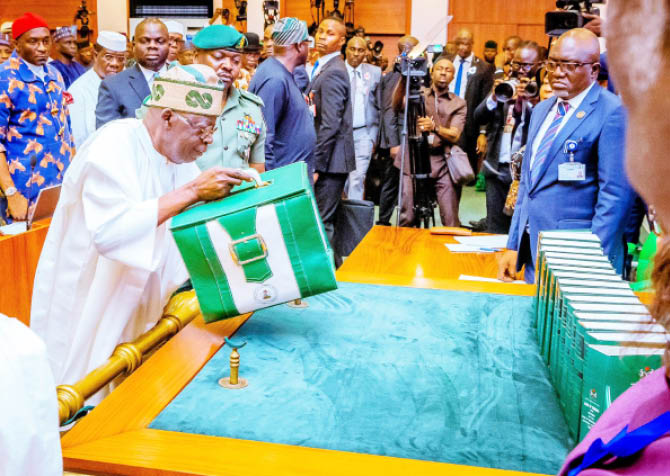Like prophets, there are two kinds of presidents. Those who come to chart a new path and breathe new life into society, and those who come merely to hold the reigns of the status quo until a reformer comes along. As a candidate, President Bola Ahmed Tinubu promised he would belong in the first category for Nigeria, but his 2024 fiscal budget—his second in six months—shows that Nigerians would wait longer to see.
Tagged as a Budget of Renewed Hope, it reads very much like one of Limited Hope. For sure, there are good highlights in the budget. The allocation of N3.25 trillion, or about 12 per cent of the total N27.5 trillion, to security is a clear indication that the President is prioritizing security above all, and rightly so. The government also notably wants to focus on a handful of priority areas, including security, macro-economic stability, infrastructure, poverty reduction, job creation and human capital development. These are in fact areas where Nigeria faces serious challenges, and the budget is spot on to focus on them.
Yet, Tinubu’s 2024 budget leaves so much to be desired. First, regardless of its name, the budget does not depart from previous years in substance, and the recent past and the present in Nigeria are anything but hopeful. With a total proposed spending of N27.5 trillion it is, in real terms, considerably lower than the N24.82 trillion budgeted for the 2023 fiscal year, given the higher rate of inflation and the lower value of the naira today. The naira has devalued significantly even against itself since last year, indicating that the N2.7 trillion increase between the 2024 and 2023 budgets is in fact effectively a reduction; scarcely the way to renew the hope of millions in a time of crisis.
This is particularly important because with the subsidy removal this year, we expected crucial sectors like education, health and infrastructure to be better served in the budget than the past year. Afterall, that has always been the argument in support of subsidy removal. But the reality of this budget falls far short of that expectation. For example, in the 2023 budget, education and health received allocations of N2.05 trillion (10 per cent of total) and N1.58 trillion (8 per cent) respectively. The corresponding allocations for education and health in the 2024 budget are not much different, at N2.2trn (7.9 per cent of total) and N1.4 trillion (5 per cent). The picture is the same even for security and infrastructure when compared to the last budget. Where then are the gains from subsidy removal which continues to inflict so much pain on Nigerians?
We can fuse tourism, culture, creativity to tell the world who we are – IBM Haruna
COP28: IsDB to assist Nigeria improve humanitarian intervention, reduce poverty
But by far the most worrisome is that the fundamentals of this budget appear detached from current realities at home and abroad. That is a fatal weakness in any proposal, let alone one that is a matter of bread and butter for millions of Nigerians. For instance, the government proposes to generate N18.32 trillion revenues and a deficit of N9.18 trillion. The 2024 revenue projection is almost double that of 2023 when the Buhari administration projected some N9.73 trillion. And to realize it, the government estimates daily oil production at 1.78 million barrels per day (mbpd) and at $77.96 barrel.
But the realities on the ground gainsay these projections. Revenue projections in Nigeria depend significantly on international oil prices, a variable over which we have little control. Nigeria’s current oil production is around 1.4 mbpd, which is commendable recovery by this government from the less than 1 mbpd production level twelve months ago. Still, 1.4 mbpd is a long way from the projected 1.78 mbpd in the budget. How will the government meet this production level over the next 12 months in light of OPEC’s clear intention to cut down production levels in order to raise flagging prices?
Furthermore, the government pegs the exchange rate at N750 per $1 and an inflation rate of 21.4 per cent. Both of these projections are simply unrealistic. The government may say its exchange rate is N750 per $1, but right now, in practice, the official exchange rate is above N800 per dollar, and nudging close to N1,200 per dollar in the parallel market. Where will the forex liquidity required to keep the exchange rate as projected in the budget come from? Also, inflation in Nigeria has been on an upward trend consistently over the past 24 months, and currently stands at over 26 per cent. How will the government reduce inflation by as much as five percentage points in a year?
Equally disturbing is that the budget is long on generalizations but short on specifics, an important marker of any serious proposal. By what percentage points do you propose to reduce poverty and through what programmes? How many millions of jobs do you propose to create and in what sectors? What specific social policies in health and education do you propose to do to enhance human capital development? These are not questions of mere emphasis or convenience, they are precisely the sort of specifics in a budget proposal that give hope to a beleaguered population.
In short, the 2024 budget follows the path of many before it, where the whole budgeting process has been turned into something no more than an academic exercise or political ritual. That is rather unfortunate for a government that promised a clean break with our unpleasant past. Still, we task the government to faithfully implement key aspects of the budget and bring relief to Nigerians. Even a little hope can be worthwhile.

 Join Daily Trust WhatsApp Community For Quick Access To News and Happenings Around You.
Join Daily Trust WhatsApp Community For Quick Access To News and Happenings Around You.



